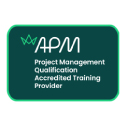Course Overview O v e r v i e w
- Course Overview
- Course Outline
- What’s Included
- What You’ll Learn
- Exam Details
APM Project Professional Qualification PPQ Course Overview
The APM Project Professional Qualification (PPQ) is a high-level certification aimed at experienced project professionals who manage complex projects. Developed by the Association for Project Management, it assesses practical competence across key areas, including leadership, governance, planning, and risk. The PPQ is aligned with the APM Body of Knowledge and reflects current industry standards.
Formal training for the PPQ helps candidates build confidence and clarity in applying Project Management principles. It provides structured learning, expert guidance, and practical examples that support deeper understanding. Being trained also improves performance in the assessment and strengthens professional credibility in competitive project environments.
Training Deals offers a focused and supportive learning experience for PPQ candidates. Our course includes expert-led sessions, tailored materials, and realistic mock assessments to aid exam readiness. We prioritise practical application and personalised support, helping professionals succeed with confidence and clarity.

APM Project Professional Qualification PPQ Course Outline
Module 1: Project Management and the Operating Environment
Term Project
State the Differences Between a Project and Business as Usual
Term Project Management
State the Key Purpose of Project Management
Terms Programme Management and Portfolio Management and Their Relationship with Project Management
Why PESTLE Analysis Might Be Used by A Project Manager
Module 2: Understand Project Life Cycles
State the Phases of a Typical Linear Project Life Cycle
State the Phases of a Typical Iterative Project Life Cycle
Define the Term Hybrid Life Cycle
Define the Term Extended Project Life Cycle
Module 3: Understand the Roles and Responsibilities Within Projects
Project Management Roles and Responsibilities
Module 4: Understand Project Management Planning
Define the Term Deployment Baseline
State How Deployment Baselines Differ Between Linear and Iterative Life Cycles
Stakeholders of a Project Management Plan
Purpose and Typical Content of a Business Case
Role of a Project Sponsor and Project Manager in Relation to Developing A Business Case
How A Stakeholder Analysis Supports Effective Stakeholder Engagement
Term Benefits Management
State Typical Estimating Methods Including Analytical Analogous Parametric
Purpose of The Estimating Funnel
Why Establishing Success Criteria Is Important at The Start During and At the Handover of a Project
Purpose and Benefits of Project Progress Reporting
Module 5: Understand Project Scope Management
Term Scope Management
Differentiate Between Scope Management Within Linear Projects and Scope Management Within Iterative Projects
How Product Breakdown Structures and Work Breakdown Structures Are Used to Illustrate the Required Scope of Work
How A Project Manager Would Use Cost Breakdown Structures Organisational Breakdown Structures and The Responsibility Assignment Matrix
Terms Configuration Management and Change Control in The Context of Scope Management
Relationship Between Change Control and Configuration Management
Stages in A Typical Change Control Process
Activities in A Typical Configuration Management Process Including Planning Identification Control Status Accounting and Verification Audit
Module 6: Understand Resource Scheduling and Optimisation in A Project
State the Purpose of Scheduling
State the Purpose of Critical Path Analysis
State the Purpose of Milestones
Define the Term Time Boxing
Options for Resource Optimisation Including Resource Levelling and Resource Smoothing
Define the Term Procurement Strategy
Module 7: Project Risk and Issue Management in The Context of a Project
Define the Term Risk
Explain the Purpose of Risk Management
Stages of a Typical Risk Management Process Including Identification Analysis Response and Closure
Describe the Use of Risk Registers
Define the Term Issue
Purpose of Issue Management
Differentiate Between an Issue and A Risk
State the Stages of An Issue Resolution Process
Module 8: Understand Quality in The Context of a Project
Define the Term Quality
Purpose of Quality Management
Define the Term Quality Planning
Define the Term Quality Control
Purpose of Quality Assurance
State the Purpose of Decision Gates Post Project Reviews Benefit Reviews and Project Audits
Module 9: Understand Communication in The Context of a Project
Define the Term Communication
Advantages of Different Communication Methods Including Face to Face Physical and Virtual
Disadvantages of Different Communication Methods Including Face to Face Physical and Virtual
Contents of a Communication Plan
Benefits to A Project Manager of a Communication Plan
Module 10: Understand Leadership and Teamwork Within A Project
Define the Term Leadership
Explain How A Project Team Leader Can Influence Team Performance
Challenges to A Project Manager When Developing and Leading A Project Team
How A Project Manager Can Use Models to Assist Team Development Including Belbin And Tuckman

What’s included in this APM Project Professional Qualification PPQ Course?
- Expert-led Training Sessions by Certified Instructors
- APM PPQ Assessment
- Digital Delegate Pack
What You’ll Learn in this Course
This course helps experienced project professionals refine their skills and apply advanced project management techniques with confidence. It focuses on real-world scenarios to develop competence across leadership, governance, planning, and risk management.
Learn how to apply APM’s core principles to complex project environments
Learn to lead teams effectively and make informed decisions under pressure
Learn to manage project governance, assurance, and stakeholder engagement
Learn to assess and respond to risks, issues, and change in dynamic settings
Learn to plan, monitor, and control projects using structured approaches
Learn to align project delivery with strategic business objectives

APM PPQ Assessment Information
The APM Project Professional Qualification (PPQ) assessment assesses professionals' expertise in Project Management principles, practices, and leadership skills. This qualification focuses on evaluating an individual's ability to effectively manage projects, lead project teams, and deliver successful project outcomes.
Assessment type: Scenario Assessment.
Duration The Scenario Assessment will be 20 minutes in duration, with 10 additional minutes preparations time. Total duration 30 Minutes.
Pass Mark: 10 marks out of 20.
Assessment type: Oral Exam.
Duration: 50 Minutes.
Pass Mark: 20 marks out of 40.
Assessment type: Written assignment.
Duration: 60 minutes, with 15 minutes preparation/reading time. Total of 75 minutes.
Pass Mark: 15 marks out 30.
Note: Two different platforms will be used for the virtual assessments - one for the scenario and oral assessment and another for the written assessment.

Our Upcoming Batches
Mon 16 Mar 2026 - Thu 19 Mar 2026
Duration: 4 Days
Mon 18 May 2026 - Thu 21 May 2026
Duration: 4 Days
Mon 20 Jul 2026 - Thu 23 Jul 2026
Duration: 4 Days
Mon 14 Sep 2026 - Thu 17 Sep 2026
Duration: 4 Days
Mon 13 Apr 2026 - Thu 16 Apr 2026
Duration: 4 Days Buxton
Mon 11 May 2026 - Thu 14 May 2026
Duration: 4 Days Buxton
Mon 1 Jun 2026 - Thu 4 Jun 2026
Duration: 4 Days Buxton
Mon 7 Sep 2026 - Thu 10 Sep 2026
Duration: 4 Days Buxton
Request More Information

Corporate Training
Elevate your workforce with expert-led corporate training that enhances skills, boosts productivity, and aligns teams with your business goals.

Individuals Training
Unlock personal growth and sharpen professional skills with tailored training designed to build your confidence and career success.
Your Path to Professional Recognition
Our path is designed to guide you through each stage with clarity, support and practical learning, helping you achieve your goals with confidence.

Step Forward with Globally Recognised Certification
A recognised certification is more than a credential. It’s proof of your commitment to professional excellence, providing you with the credibility, confidence, and global reach to advance your career in exciting new directions.
Globally Certified Professionals Over Time
Career Growth
81%Certified professionals reported receiving a promotion after earning their certification.
Global Opportunities
89%Certified professionals experienced access to new career opportunities, including leadership roles and global positions.
Not able to find what you are looking for
Our experts will guide you to the right course from thousands worldwide: tailored to your goals.
Frequently Asked Questions
The APM Project Professional Qualification (PPQ) is an advanced certification that assesses a project professional’s ability to manage complex projects and lead teams effectively. It focuses on practical competence across leadership, governance, planning, and risk management.
The PPQ is ideal for experienced project professionals looking to validate their competence in managing complex projects and leading teams.
The assessment includes a scenario-based exercise, an oral exam, and a written assignment, each designed to test the practical application of Project Management skills.
The course and assessments are delivered virtually using two platforms; one for the scenario and oral components, and another for the written assignment.
Candidates must achieve 10/20 for the scenario, 20/40 for the oral exam, and 15/30 for the written assignment to pass.
What Our Customers Say About Us
 Matthew Sullivan
HR Business Partner
Matthew Sullivan
HR Business Partner
Our HR team registered for the Change Management Foundation & Practitioner Training Course, and it couldn’t have been more valuable. The team gained practical frameworks to guide employees smoothly through transitions with confidence.
 Olivia Barrett
Operations Manager
Olivia Barrett
Operations Manager
Our operations staff completed the Lean Six Sigma Green Belt Training Course, and it has been transformative. We can now identify inefficiencies quickly, and the tools we learned are already improving performance across the team.
 Benjamin Foster
Product Manager
Benjamin Foster
Product Manager
Our product team took part in the Agile Project Management Foundation & Practitioner (AgilePM®) Training Course, and the difference is remarkable. We’re now more adaptive, collaborative, and efficient in managing change.
 Lucy Harper
IT Support Lead
Lucy Harper
IT Support Lead
Our IT support unit attended the ITIL® 4 Foundation Training Course, and the results have been impressive. Processes are smoother, collaboration has improved, and the team finally speaks a common language of service management.
 Edward Clarke
Programme Manager
Edward Clarke
Programme Manager
We joined the PMP® Certification Training Course as a leadership group, and it was outstanding. The trainer made every concept practical, and the exam preparation resources helped the whole team feel ready to tackle complex projects.
 Amelia Rhodes
Project Officer
Amelia Rhodes
Project Officer
Our project office completed the PRINCE2® Foundation & Practitioner Training Course, and it has brought real clarity to how we manage projects. The trainer’s examples were excellent, and the team now follows a structured approach with confidence.

























